Savoir Faire
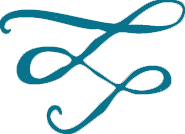
1,000+ F OREIGN W ORDS & P HRASES Y OU S HOULD K NOW TO S OUND S MART - Laura Lee

2016 Tandem Books, Inc. First published in the United States of America in 2016 by Wellfleet Press, a member of Quarto Publishing Group USA Inc. 142 West 36th Street, 4th Floor New York, New York 10018 quartoknows.com Visit our blogs at quartoknows.com All rights reserved. No part of this book may be reproduced in any form without written permission of the copyright owners. All images in this book have been reproduced with the knowledge and prior consent of the artists concerned, and no responsibility is accepted by producer, publisher, or printer for any infringement of copyright or otherwise, arising from the contents of this publication. Every effort has been made to ensure that credits accurately comply with information supplied.
We apologize for any inaccuracies that may have occurred and will resolve inaccurate or missing information in a subsequent reprinting of the book. 10 9 8 7 6 5 4 3 2 1 Digital edition: 978-1-62788-955-1
Softcover edition: 978-1-57715-125-8 Cover Design and Page Layout: Ashley Prine, Tandem Books Editor: Katherine Furman, Tandem Books Cover Illustration and Page Borders: swiejko/Creative Market To all of my foreign language teachers:
Merci. Danke. Gratias tibi ago.
And to Valery Lantratov, spasibo. 
Contents
Guide
INTRODUCTION
IVE HAD A FASCINATION WITH FOREIGN LANGUAGES since I was a kid watching segments on
Sesame Street in English and Spanish. I grew up in metro Detroit, near the Canadian border.
As soon as the U.S. version of Sesame Street was finished, I could switch over to the Canadian channel and watch a version with segments in French. I somewhat randomly chose French as my foreign language in high school and that is how I ended up as an exchange student living outside Paris. One of my classes at the Lyce de Pontoise was Latin. I word it this passive way because it would be a bald-faced lie to say I learned Latin or even that I studied it. I would like to have mastered Latin (Italian, French, Spanish, and Portuguese are more or less just Latin spelled badly), but I was confronted with a major obstacle to learning it: I was being taught it in French.
When you learn a living language, like French, you begin with quotidian phrases like Can you please direct me to the train station? When you study a dead language, like Latin, they start your instruction with phrases like The knights conquered valiantly, and All of Gaul is divided into three parts. I did not even know how to say these things in French! I was doomed to fail my French-Latin class, but my kind instructor gave me an A for effort and passed me anyway. I took away three things from my Latin class: 1. Latin is hard. 2. No one knows how it was pronounced.
The accepted pronunciation of a Latin term uttered by a French speaker will sound French. It will be a bit more Germanic to a German speaker and Russian to a Russian. 3. Those Romans really got around. In Europe you encounter several languages on an almost daily basis. When I returned to America, I felt a bit illiterate with my one and a half languages, so I decided to study German.
I had the option at my high school of studying Russian, but I made the reasonable assumption that I would never use it. This was a mistake. I did not know then that I would one day end up working with Russian ballet dancers, and becoming partners with a Muscovite. My first second language is now Russian (along with a hefty dose of French ballet terminology). Now I can ask for directions to the train station in four languages (including English), and understand the response in at least three. I can still converse about Roman emperors and the divisions of the landmass once known as Gaul in only one.
If you want to understand relatively new English words, however, there is hardly a better combination of foreign languages to study than French-Latin-German. Our mother tongue came to Britain by way of Germanic tribesthe Angles, Saxons, and Jutes. These warring ancestors were eventually converted to Christianity, and their language was augmented by the religions Latin and Greek texts. The English language (named for the Angles) nearly died out when the Vikings took over most of the English-speaking kingdoms in Britain between 793 and 878. In 1066, the island was conquered by French-speaking Normans, and for almost three hundred years, England had a French-speaking monarchy. English would not be used again by a British king in official documents until Henry V in 1415.
Most words in English have near synonyms with slightly different nuances dating back to the social classes of Norman times. English was the language of the peasants. (Henry Vs predecessor, Edward III, only knew enough English to swear in it.) French was the language of the aristocracy, and Latin the language of scholars. So today a word with an Anglo-Saxon root sounds simple and earthy, a French synonym sounds a bit more elevated and classy, and a similar word with a Latin root sounds scholarly. For example, Saxons would say king, the French have a monarch, and the Latins had a regent. These days, lawyers drop Latin; upscale hoteliers drop French.
Thanks to a long history of being the underdog, English became an incredible borrowing language and has one of the largest vocabularies of any language. The Oxford English Dictionary lists about 500,000 words. German, by comparison, is estimated to have a vocabulary of about 185,000 words, and French less than 100,000. English is also the great linguistic comeback kid. These days it is the lingua franca for business, popular culture, and international communications. And after centuries of taking terms from many languages, it is now more often a lender than a borrower, giving the French words like le weekend and les blue-jeans.
Linguistic purists across the world fret about hybrid languages they call Spanglish or Russlish. Non-native speakers of English are believed to outnumber native speakers by a ratio of three-to-one, and OK is the most popular word in the world. The words and phrases we borrow are time capsules containing entire histories of contact between cultures. By looking at the borrowings from a language as a group, you get a sense of the cultural stereotypes English speakers held about their various neighbors. French is cultured. Yiddish is funny.
Spanish is macho. Italian is musical. Greek is scholarly. German is strong and serious. Asian is spiritual, giving us words for religious concepts, meditation techniques, martial arts, and alternative medicine. It is estimated that 80 percent of English was borrowed from foreign languages.
Anglo-Saxon is still its backbone, and the one hundred most frequently used words are from the ancient mother tongue (examples: the, is, you, here, there), but the bulk of our everyday speech is filled with words from other European languages. With such a rich foreign vocabulary, this could be a very thick book. So for our purposes, I have limited the entries to words that retain their foreign characterwords that are used more or less as they were used in their home countries and which strike the listener as being from another tongue. I did not include words that were borrowed from other languages in a changed form. I also decided not to include food words, so no burritos, borscht, kimchi, or sashimi. I also left out (with only a couple of exceptions) words that are derived from personal names or places.






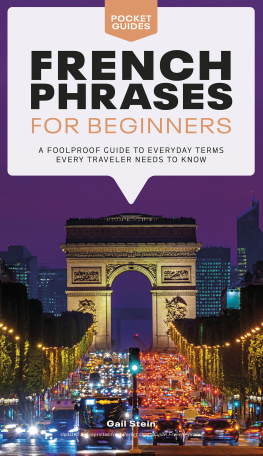


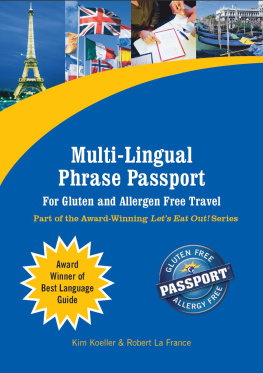

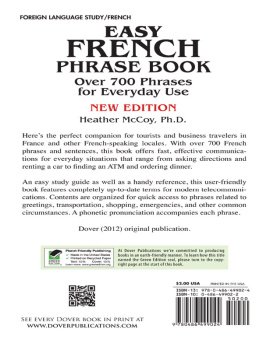

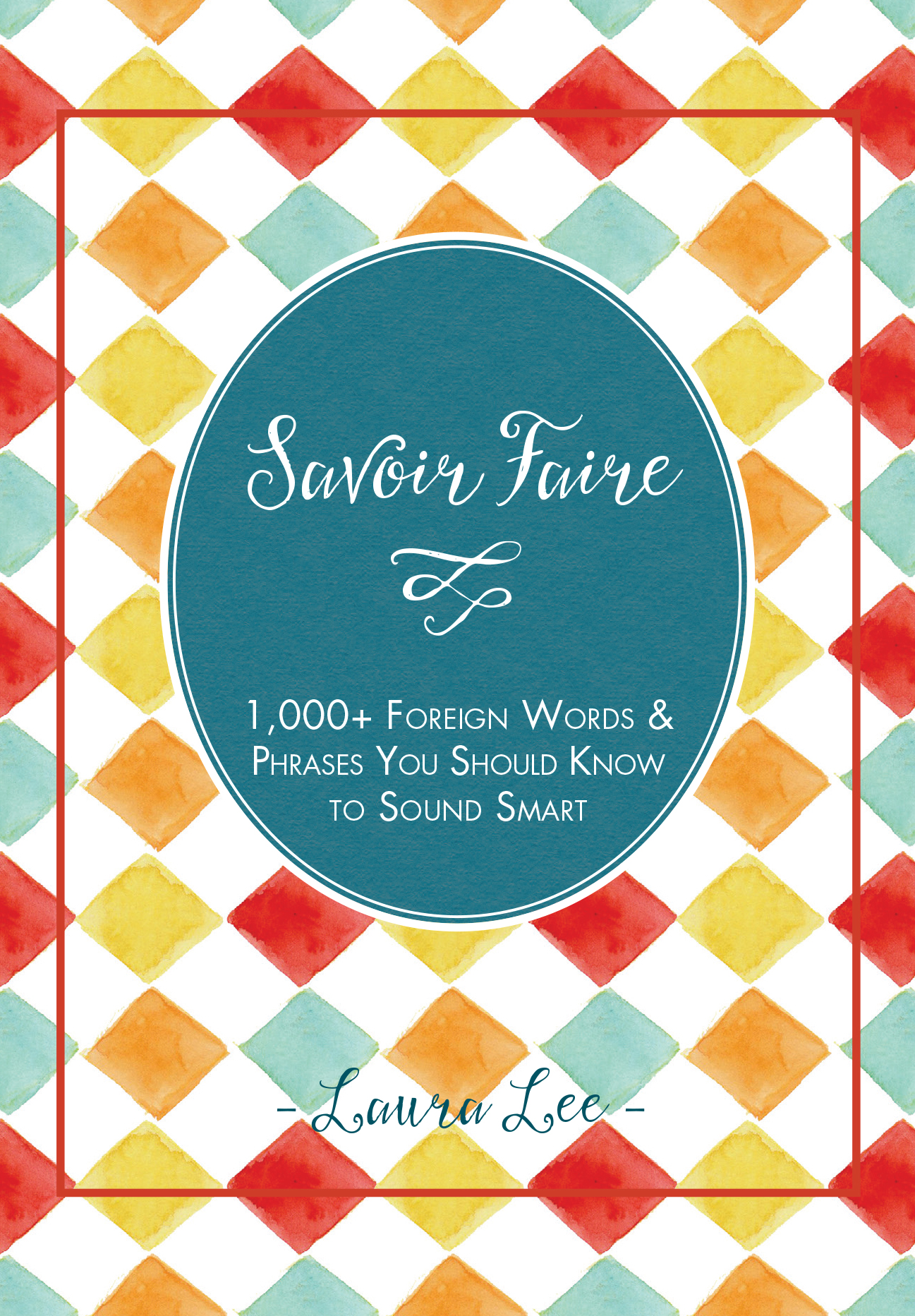
 1,000+ F OREIGN W ORDS & P HRASES Y OU S HOULD K NOW TO S OUND S MART - Laura Lee
1,000+ F OREIGN W ORDS & P HRASES Y OU S HOULD K NOW TO S OUND S MART - Laura Lee  2016 Tandem Books, Inc. First published in the United States of America in 2016 by Wellfleet Press, a member of Quarto Publishing Group USA Inc. 142 West 36th Street, 4th Floor New York, New York 10018 quartoknows.com Visit our blogs at quartoknows.com All rights reserved. No part of this book may be reproduced in any form without written permission of the copyright owners. All images in this book have been reproduced with the knowledge and prior consent of the artists concerned, and no responsibility is accepted by producer, publisher, or printer for any infringement of copyright or otherwise, arising from the contents of this publication. Every effort has been made to ensure that credits accurately comply with information supplied.
2016 Tandem Books, Inc. First published in the United States of America in 2016 by Wellfleet Press, a member of Quarto Publishing Group USA Inc. 142 West 36th Street, 4th Floor New York, New York 10018 quartoknows.com Visit our blogs at quartoknows.com All rights reserved. No part of this book may be reproduced in any form without written permission of the copyright owners. All images in this book have been reproduced with the knowledge and prior consent of the artists concerned, and no responsibility is accepted by producer, publisher, or printer for any infringement of copyright or otherwise, arising from the contents of this publication. Every effort has been made to ensure that credits accurately comply with information supplied.